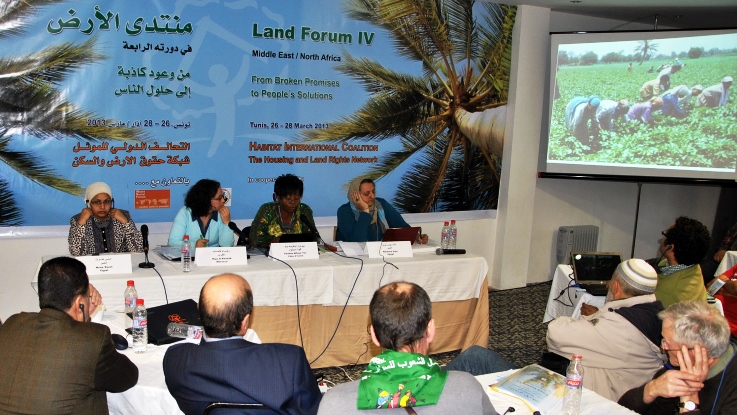
Experiences
of Struggle Transformed into Achievements
From the 26 – 28 March, the Habitat International
Coalition’s Housing and Land Rights Network organized its 4th Land Forum for the Middle East/ North Africa region
under the title: “From Broken Promises to People’s Solutions.”
The Land Forum convened experts and social movement
activists to share their timely struggles over land and natural resources in
Ahwaz, Algeria, Egypt, Iraq, Jordan, Lebanon, Morocco, Palestine, Syria,
Tunisia and Western Sahara, as well as the land struggles of the Amazigh,
Kurdish and Nubian peoples, addressing:
• Constitutional reform and
transitional justice
• Gender dimensions of land
• Conflict, occupation and
war
• Environment and water
• Indigenous peoples across
the Middle East/ North Africa
• Struggles of rural
agriculture and food sovereignty
• Urban land and the right
to housing.
• International dimensions:
Lessons from social movements
• Civic participation in
global policy making
The participants confirmed the conviction of previous
Land Forums, that civil society across the region faces the challenge to
articulate alternatives to current concepts of the state and state land. The
strategic methodology of knowledge creation and fundamental policy reform
remains rooted in the body of applicable human rights norms. However, this
approach also must correct the assumptions of colonial laws and policies,
including the legacy of Ottoman rule that continues to dispossess the land and
other natural resources of communities and peoples. Alternatives include the
fundamental transformation of the state to respect, protect and fulfill the
indivisible bundle of human rights to ensure the self‐determination
of all peoples and nondiscrimination institutionalized through equal
citizenship and gender equality. In addition to the state’s obligation to
ensure the right to equitable and adequate housing, land, water and productive natural
resources, civil oversight of the state must ensure that it upholds these
rights through the effective rule of law, progressive realization of rights,
dedicating the maximum of available resources and international cooperation,
including the states’ extraterritorial obligations to uphold human rights that relate
to land and natural resources vis‐à‐vis
all external actors.
Current and future efforts of civil initiatives in the
region will seek to develop and apply concepts of the state’s duty to implement
the social function of property, social production of habitat and the “right to
the city.” The region’s civil society will pursue capacity
building through exchanges of experience and expertise with counterparts and
social movements in other regions, in order to accelerate knowledge creation,
civic education and the development of appropriate programs and strategies.
Future knowledge creation by the region’s civil society will seek to develop
and apply needed additional indicators to convey the urgent human need for
fundamental reforms in land‐use and general
development policies in our countries.
* To download the pdf, click here.